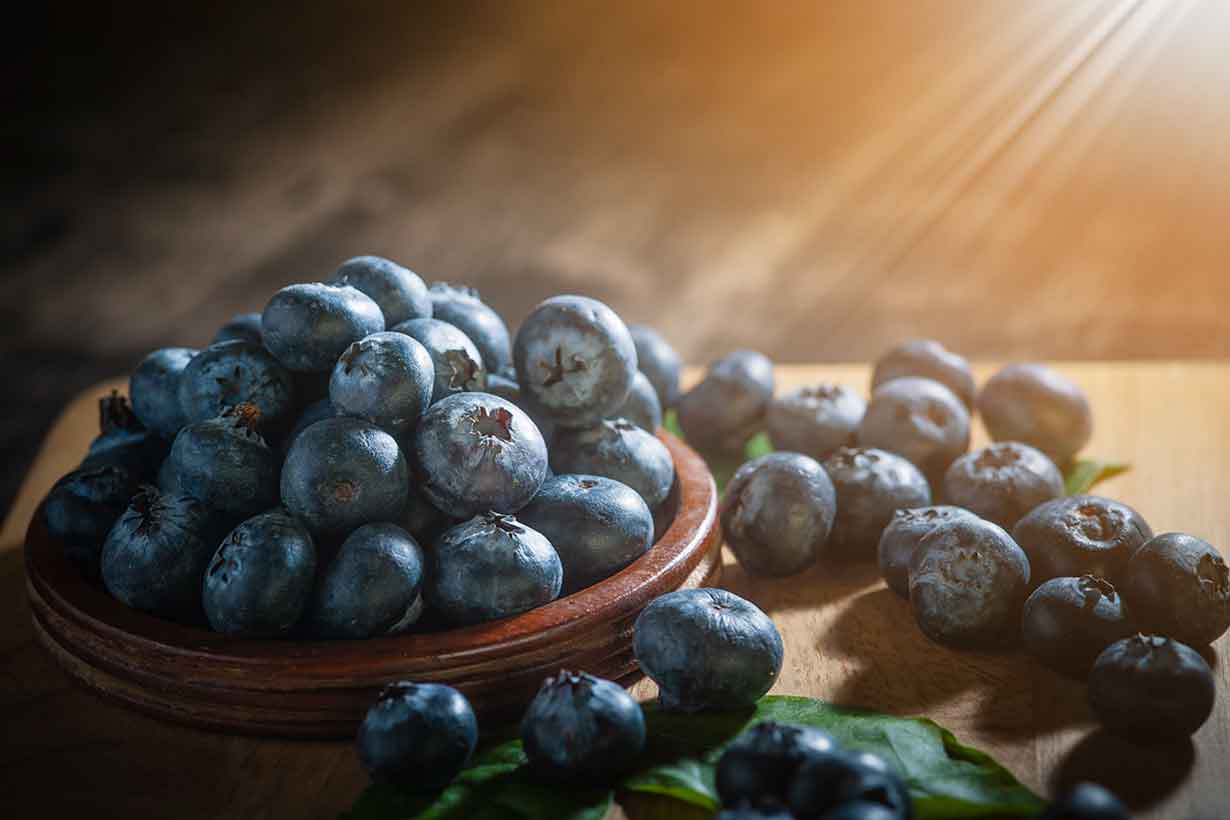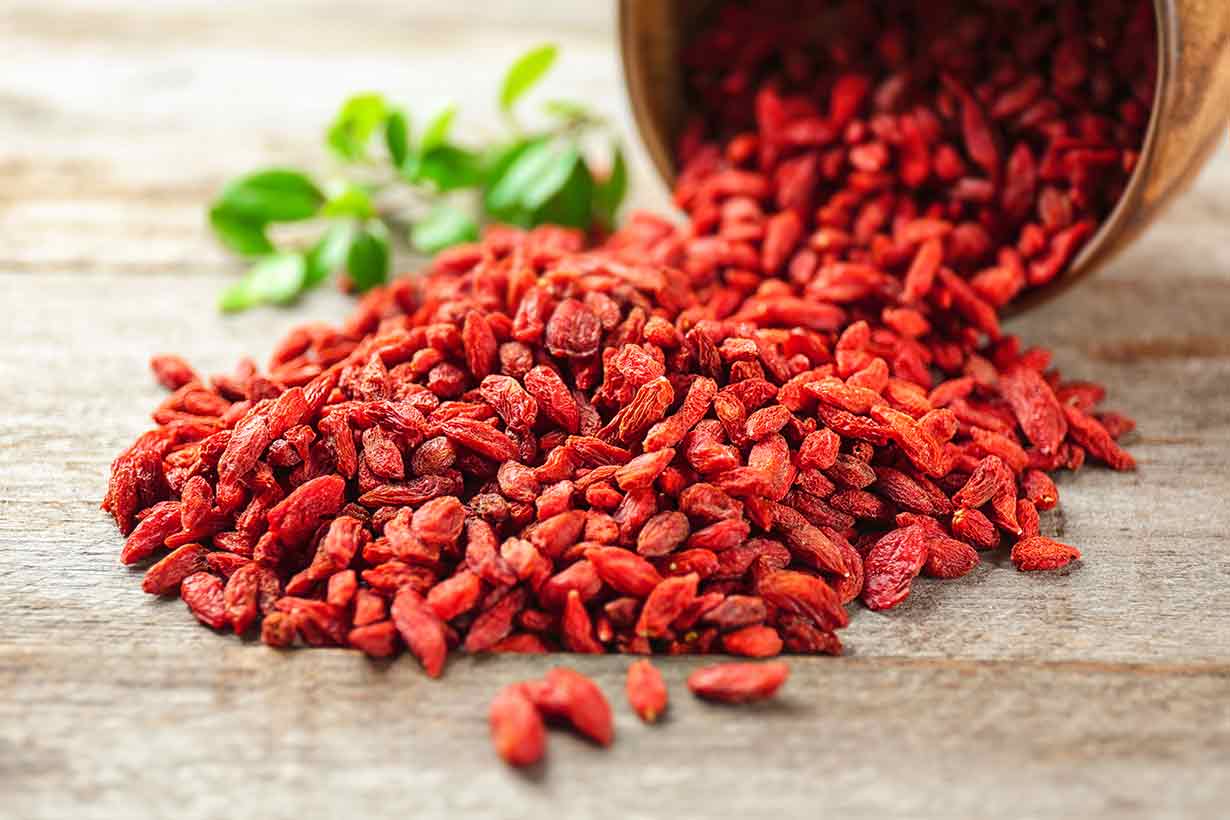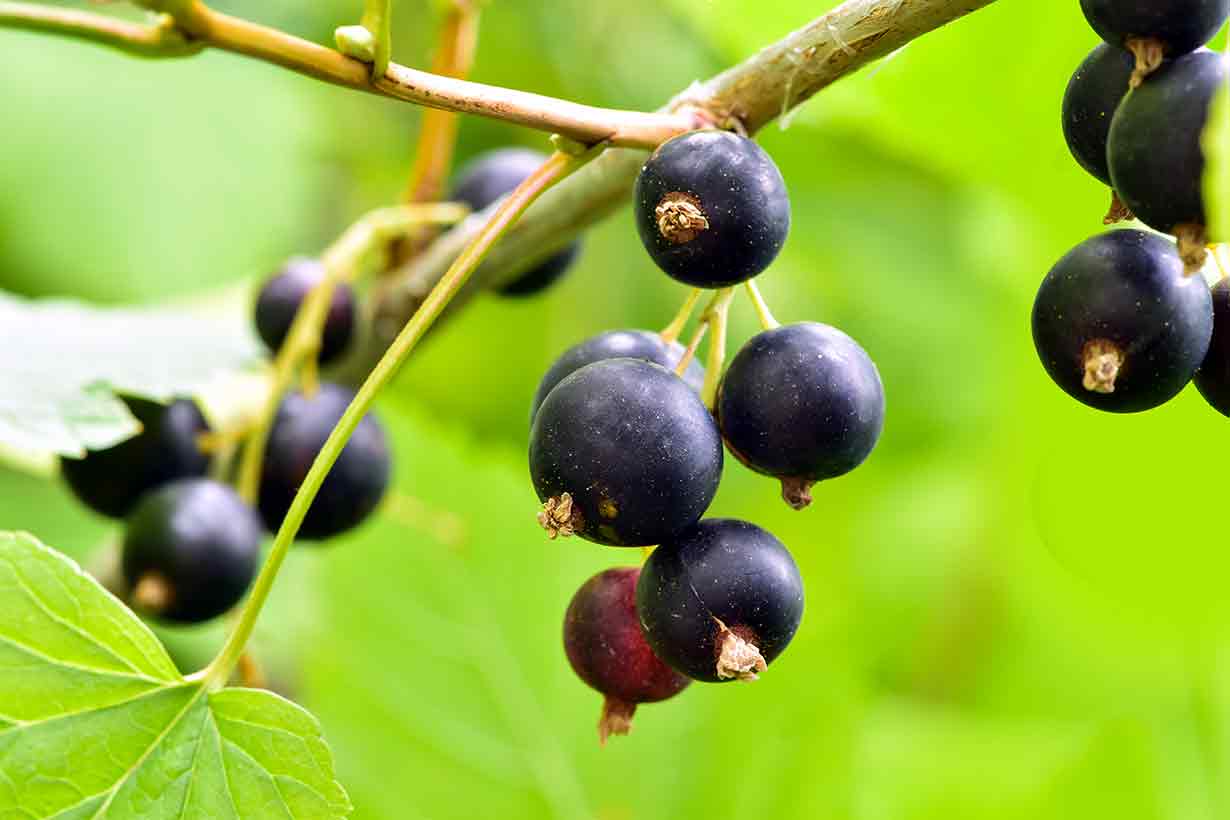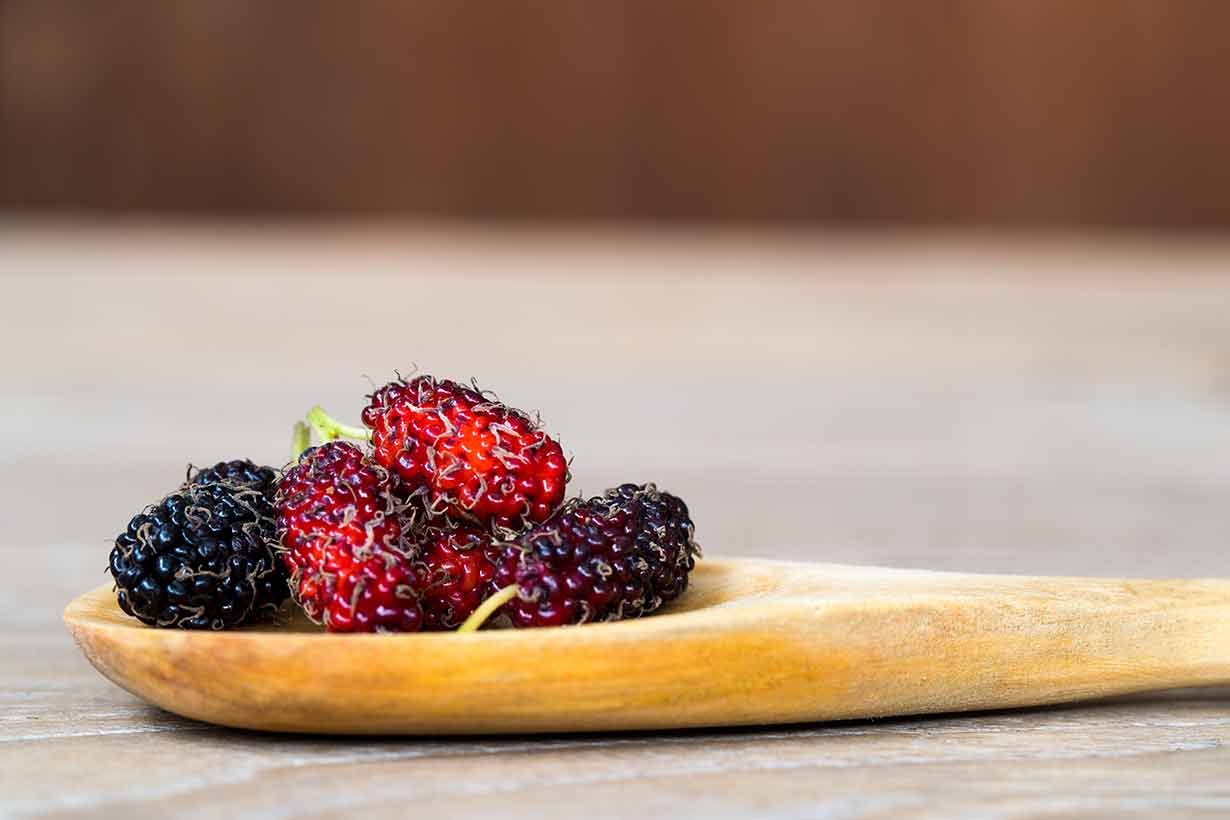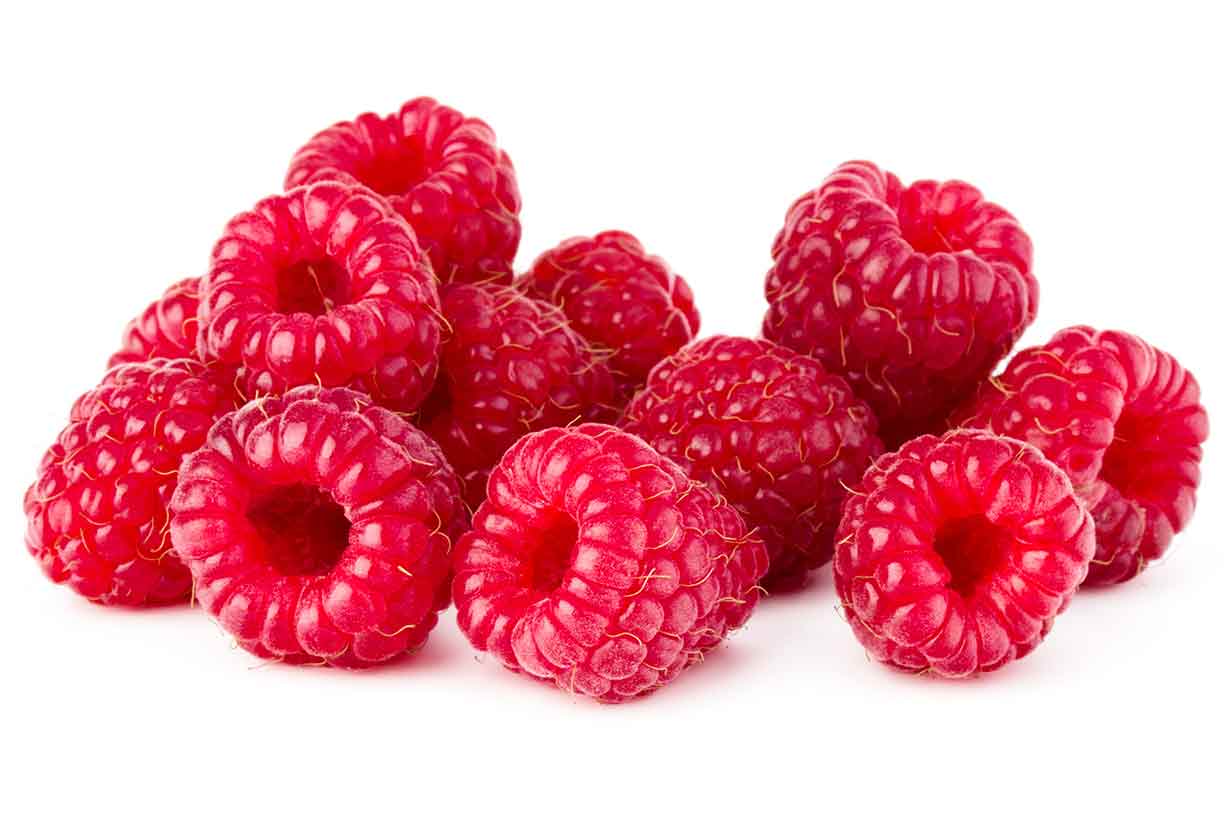Blackberries are one of the most nutritious choices of fruit.
These little black berries are just as delicious as they are healthy, which explains their popularity around the world.
This article examines eight benefits of consuming blackberries and summarizes their impressive nutrition profile.
What Are Blackberries?
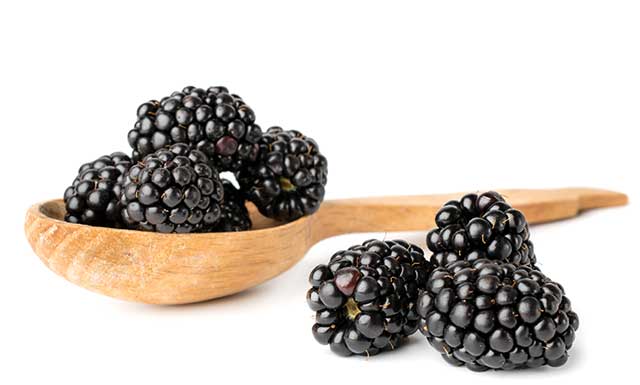
Blackberries are a dark edible berry that grows throughout the world, and there are more than 375 species of the fruit (1).
Once ripe, blackberries have a soft texture and a sweet and juicy taste, somewhat similar to raspberry but with a slightly different flavor.
Blackberries grow in the wild around much of the world, and evidence suggests they have been part of the human diet—in Europe at least—for thousands of years (2).
Health Benefits
Blackberries have several interesting health benefits ranging from their nutrient values to potential benefits from the phytonutrients they contain.
1) Blackberries Are a Rich Source of Vitamin C
Blackberries provide around 50% of the RDI for vitamin C per cup, which works out at 35% per 100 grams (3).
Vitamin C is an essential vitamin that plays an antioxidant role in the body, and it helps with;
- Strengthening the immune system and enhancing the immune response (4)
- Protecting the body’s cells against free radical-induced damage (5)
- Playing a role in the synthesis of collagen (6)
2) Blackberries Are Loaded With Polyphenols
Polyphenols are a type of phytochemical believed to have numerous potential health benefits.
Notably, blackberries are one of the most concentrated sources of polyphenols out of all foods.
The polyphenol classes that blackberries contain include anthocyanins, which provide their purple color, and flavanols, flavonols, and phenolic acids.
Amongst these groups, the most concentrated compounds are ellagic acid and cyanidins (7).
Although the research on polyphenols is still early and not fully understood at this point, these compounds may have a range of health-promoting effects.
Once (wrongly) thought to act as direct antioxidants in the body, researchers now hypothesize that polyphenols upregulate the body’s own antioxidant and immune systems (8, 9).
3) High In Manganese
Manganese is a mineral that plays an important role in the skeletal system.
As part of this, a sufficient intake of manganese helps with (10, 11, 12, 13);
- Wound healing
- Keeping bones and cartilage strong and healthy
- Regulating blood glucose levels
- Absorption of dietary calcium
100 grams of blackberries supplies around 32% of the RDI (3)
4) Source of Vitamin K1
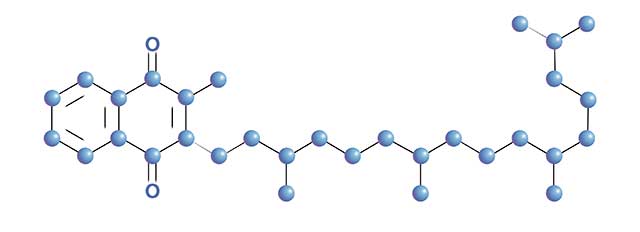
The third most concentrated nutrient in blackberries is vitamin K1 (phylloquinone).
Although this vitamin tends to be present in greater quantities in leafy greens and green vegetables, blackberries supply a reasonable source.
To be specific; there is approximately 25% of the RDI for vitamin K1 per 100 grams of blackberries (3).
Vitamin K provides numerous protective effects on the body. For example, the vitamin helps with blood clotting (coagulation) (14).
Vitamin K also assists with bone formation and helps to prevent soft tissue calcification. Vitamin K does this by directing calcium to the skeletal system and away from the arteries (15).
However, it is worth noting that vitamin K2 (present in animal foods and fermented soy) is likely the better and more bio-available source of vitamin K (16).
5) May Promote Fat Oxidation and Insulin Sensitivity
Interestingly, a recent study found that eating blackberries instead of different carbohydrate sources may increase fat oxidation and heighten insulin sensitivity.
This particular study was a randomized, placebo-controlled trial featuring overweight or obese men (17).
The men were split into two groups and researchers controlled (and provided) their meals for seven days;
- Group A: fed on a calorie and carbohydrate-controlled diet featuring 600 grams of blackberries per day
- Group B: consumed a calorie and carbohydrate-matched diet featuring a gelatin-based, flavonoid-free control
The trial involved a stay in a room-sized calorimeter (metabolic chamber) and a glucose tolerance test took place at the beginning—and end—of the trial.
Notably, there were significantly improved blood glucose, fat oxidation, and insulin sensitivity results in the blackberry group.
6) Blackberries Are Low In Carbohydrate and High In Fiber
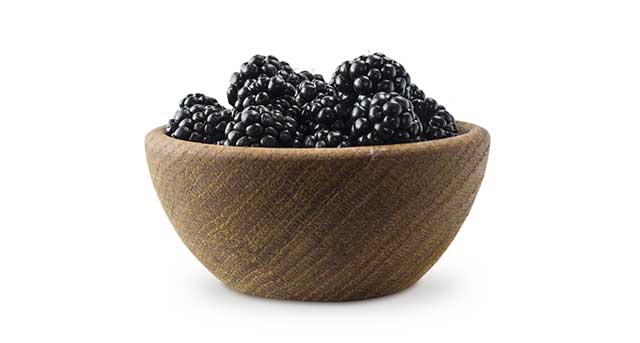
Blackberries have an interesting nutrition profile because they are one of the lowest carbohydrate fruits, but also one of the highest in fiber.
As a result, this makes blackberries an excellent low-carb, high-fiber fruit option.
For anyone on a low-carbohydrate diet, this makes blackberries a great choice because they are extremely low in digestible “net” carbohydrate.
Per 100 grams, these berries provide 10.2 grams of carbohydrate, 5.3 grams of which is fiber (3).
Additionally, for people seeking to increase their fiber intake, blackberries offer more fiber than most grains do.
For example, the table below shows how the fruit compares to other fiber-rich sources per 100 grams (18, 19);
| Food | Fiber (per 100 g) | Calories |
| Blackberries | 5.3 g | 43 kcal |
| Brown Rice | 3.5 g | 370 kcal |
| Wholewheat Bread | 6.8 g | 247 kcal |
As shown, blackberries offer significantly more fiber per calorie than either brown rice or wholewheat bread.
7) Nutrient Density: Low In Calories
Another benefit of blackberries is that they are very low in calories.
First of all, calories are not a determinant of whether or not food is healthy. Many healthy foods are high in calories, and some nutrient-poor foods are low in calories.
In other words, calories alone are not useful in determining a food’s quality.
However, blackberries offer a decent range of nutrients for minimal calories, which makes them reasonably nutrient-dense.
8) May Have Cardiovascular Benefits
Ongoing research has been examining the health properties of different berries, particularly for potential cardiovascular benefits.
A recent study specifically on blackberries was a randomized clinical trial featuring 72 participants with dyslipidemia (abnormally elevated cholesterol) and high blood pressure (20).
Interestingly, the results showed that after eight weeks of blackberry consumption, the participants had improved concentrations of HDL, Apo B, CRP (a marker of inflammation) and lower blood pressure.
Furthermore, a systematic review of berry-based food interventions for cardiovascular risk identified 17 high-quality randomized controlled trials.
Amongst these studies, two-thirds reported positive effects on either;
- Arterial stiffness
- Blood pressure
- Cholesterol profile
- Glycemic (blood glucose) profile
As a result, the systematic review concluded that there is “moderate to strong evidence for the inclusion of berries as part of a cardioprotective diet” (21).
Do Blackberries Have Any Drawbacks?
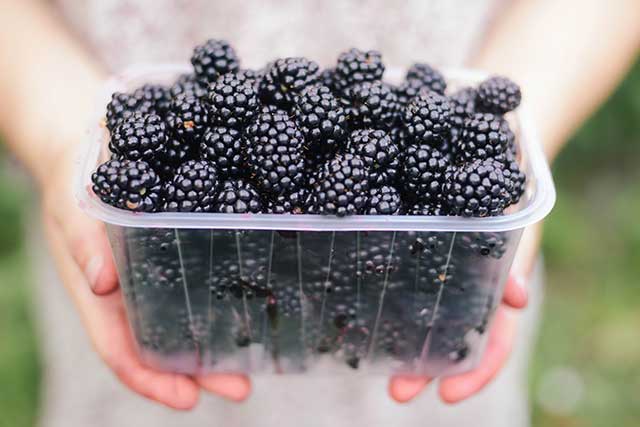
While blackberries are a healthy and nutritious food choice, there are one or two things to be aware of.
Serving Size
Firstly, it is possible to over-consume them.
A frequent mistake people make is to think that because a particular food is healthy, “more is better,” but that is often not the case.
Although blackberries contain beneficial nutrients, they are also a source of fructose (fruit sugar).
In reasonable serving sizes, this is nothing to worry about. But hundreds of grams of the berries per day would be overdoing it.
Generally, a typical serving size anything from half a cup (72 g) to one cup (144 g).
Canned Blackberries
Fresh and frozen blackberries are 100% fruit with no additional ingredients, but this isn’t the case for canned blackberries.
Generally speaking, canned fruit comes in a ‘light syrup’ which is little more than liquid sugar.
As a result, canned blackberries are higher in both calories and sugars.
Nutrition Facts
The following tables provide an at-a-glance overview of the nutritional values for blackberries per 100 grams (3).
Calories and Macros
| Calories/Nutrient | Amount (kcal/grams) |
| Calories | 43 kcal |
| Carbohydrate | 10.2 g |
| Fiber | 5.3 g |
| Sugars | 4.9 g |
| Fat | 0.5 g |
| Protein | 1.4 g |
As shown, blackberries are low in calories and primarily a source of (fibrous) carbohydrate.
Vitamins
| Vitamin | Amount (% RDI) |
| Vitamin C | 35 % |
| Vitamin K1 | 25 % |
| Folate | 6 % |
| Vitamin E | 6 % |
| Vitamin A | 4 % |
| Vitamin B3 | 3 % |
| Vitamin B5 | 3 % |
| Vitamin B2 | 2 % |
| Vitamin B1 | 1 % |
| Vitamin B6 | 1 % |
As the table demonstrates, blackberries are a rich source of vitamin C and K1.
Although they contain a wide range of further vitamins, none of these are in high concentrations.
Minerals
| Mineral | Amount (% RDI) |
| Manganese | 32 % |
| Copper | 8 % |
| Magnesium | 5 % |
| Potassium | 5 % |
| Zinc | 4 % |
| Calcium | 3 % |
| Iron | 3 % |
| Phosphorus | 2 % |
| Selenium | 1 % |
| Vitamin B6 | 1 % |
Blackberries offer a good source of manganese and a moderate amount of copper.
Aside from this, all other minerals are present in small low concentrations.
Final Thoughts
The media often call blackberries a “superfood,” but this is overplaying their benefits.
While this fruit is very healthy, no single food can make or break our health, and it is our overall diet that matters the most.
However, blackberries do contain numerous beneficial nutrients, they are also full of polyphenols, and high-quality studies suggest some potential health benefits.
Lastly, another positive point about these berries is that they taste delicious.
Especially in a combination of blackberries and cream.
For more on berries, see this guide to strawberries.



